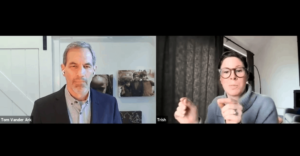Podcast: Flynn Coleman on a Human Algorithm

AI is a concern for the future of learning and working. While many believe AI will erase current jobs, there are equal amounts of optimism about how many new jobs will be created through AI. The same can be said for education and the new tools that AI can bring to learning.
AI can deliver rich information and data but humans using that data will likely always be better equipped to make decisions in the workplace. According to McKinsey, nearly 6 out of 10 current occupations have 30% of their jobs that could be automated. AI in this instance should be seen as a tool to improve productivity and not a pure replacement.
Similar technology can be used to reskill workers and be used for adaptive testing for students. There are jobs that will be created through the use of technology that does not currently exist and AI will assist in both learning at a young age and reskilling the current workforce.
A major ongoing concern for the use of AI in both learning and working is the inherent bias from humans that develop the technology. All development should include an ethical and moral decision tree to project possible outcomes and better protect those who the technology is intended to serve.
Flynn Coleman is an author, an international human rights attorney, a professor, a public speaker, a social innovator and entrepreneur, a social justice activist, a former competitive athlete, an ethical fashion designer, and a founder and CEO. Coleman has a BSFS from Georgetown University, a JD from UC Berkeley School of Law, and an LLM from the London School of Economics and Political Science.
In addition to her formal degrees, she has studied and worked across the world – to name a few places Senegal, Ireland, Italy, Chile, Cambodia, Switzerland, France, Netherland, Hong Kong, and Fiji. Flynn has spoken, written, and taught extensively on issues of war crimes, genocide, emerging technologies, behavioral economics, and behavioral science. She has taken her interest in human rights and social justice and turned it into a career supporting communities around the world.
In a recent podcast, Tom spoke with Flynn about how It’s never been easier for young people to use technology to make an impact. The future of education, both teaching and learning will be much more interdisciplinary and we will need to harness the power of technology and resilience from diverse populations around the world.
Her new book A Human Algorithm explores how AI has the opportunity to highlight the humanity that binds us all. She is optimistic about the benefits of AI and believes that if the technology that we are building is embedded with compassion and empathy for others, there is mass potential to witness the positive sides of humanity and fewer war crimes and anarchy.
Tom and Flynn discuss how we can use compassion, empathy, and ethics in AI development and curriculum. Now more than ever, the power of place is imperative and the lessons it can be used in curriculum design. Flynn describes how her extensive travels of the world provided her a lens into communities that she would never be able to reach before and how interconnected we really all are. The future will require compassionate, moral, and ethical leadership. These are the same principles that should be instilled in curriculum and teaching students to have empathy for those around them.
Key Takeaways:
[:59] How and why did Flynn gain the opportunity to study in so many countries during high school and college?
[1:56] Did Flynn’s parents value travel or support her in traveling?
[2:32] What led Flynn to become interested in human rights?
[3:39] If Flynn had to pick out her favorite interesting place to learn, which would she choose?
[6:25] Why place-based education is so incredibly valuable for learners.
[7:32] After doing a JD at Berkeley, Flynn went on to the London School of Economics and Political Science for a master’s in law. Flynn elaborates on why she took this path.
[9:09] Flynn has crafted a life for herself that uniquely combines the practice of human rights law with teaching and writing. What is the thread that runs through it?
[10:58] When and how did artificial intelligence come across Flynn’s radar?
[11:46] Flynn speaks about her book, A Human Algorithm, and why she decided to write it.
[14:19] Flynn shares more about what her book encompasses, the process of writing it, and some of the challenges she faced while working on it.
[15:57] Jessica shares an important resource with listeners: the Getting Through microsite.
[16:36] Does Flynn feel that A.I. will be the best thing we’ve ever invented or the biggest existential threat we’ve ever faced?
[19:09] Why right now, more than ever, it’s easier for young people to make a difference.
[21:07] Which should we be most concerned with right now? Discrimination, autonomous weapons, or excessive surveillance?
[24:26] Tom and Flynn dive deeper into the human rights legal issue emerging today that is excessive surveillance.
[29:19] Tom and Flynn discuss the need for a different economic system moving forward and a more nimble form of governance. Flynn also provides her thoughts on how we could build more nimble political structures that would allow us to be more responsive to certain complex systems.
[33:20] What should young people know about artificial intelligence? And what are some of the implications regarding education?
[36:30] Does Flynn think it’s a good idea that some leading school districts are beginning to teach their middle school students the ethics of A.I?
[39:51] Flynn shares what her new book will be about.
[41:21] Tom and Flynn speak about the audience her recently published book, A Human Algorithm, is for.
[42:52] Where to find Flynn online!
[43:03] Tom thanks Flynn for joining the Getting Smart podcast!
Mentioned in This Episode:
GettingSmart.com/GettingThrough
Flynn Coleman
A Human Algorithm: How Artificial Intelligence Is Redefining Who We Are, by Flynn Coleman
The Power of Place: Authentic Learning Through Place-Based Education, by Tom Vander Ark
Dr. Sharon Blackie
For more, see:
- Preparing All Learners for an Uncertain Future of Work
- New School Formula: Harder Problems and Fewer Answers
- Helping Students Prepare for Their Futures with Linkedin
Stay in-the-know with innovations in learning by signing up for the weekly Smart Update.






0 Comments
Leave a Comment
Your email address will not be published. All fields are required.